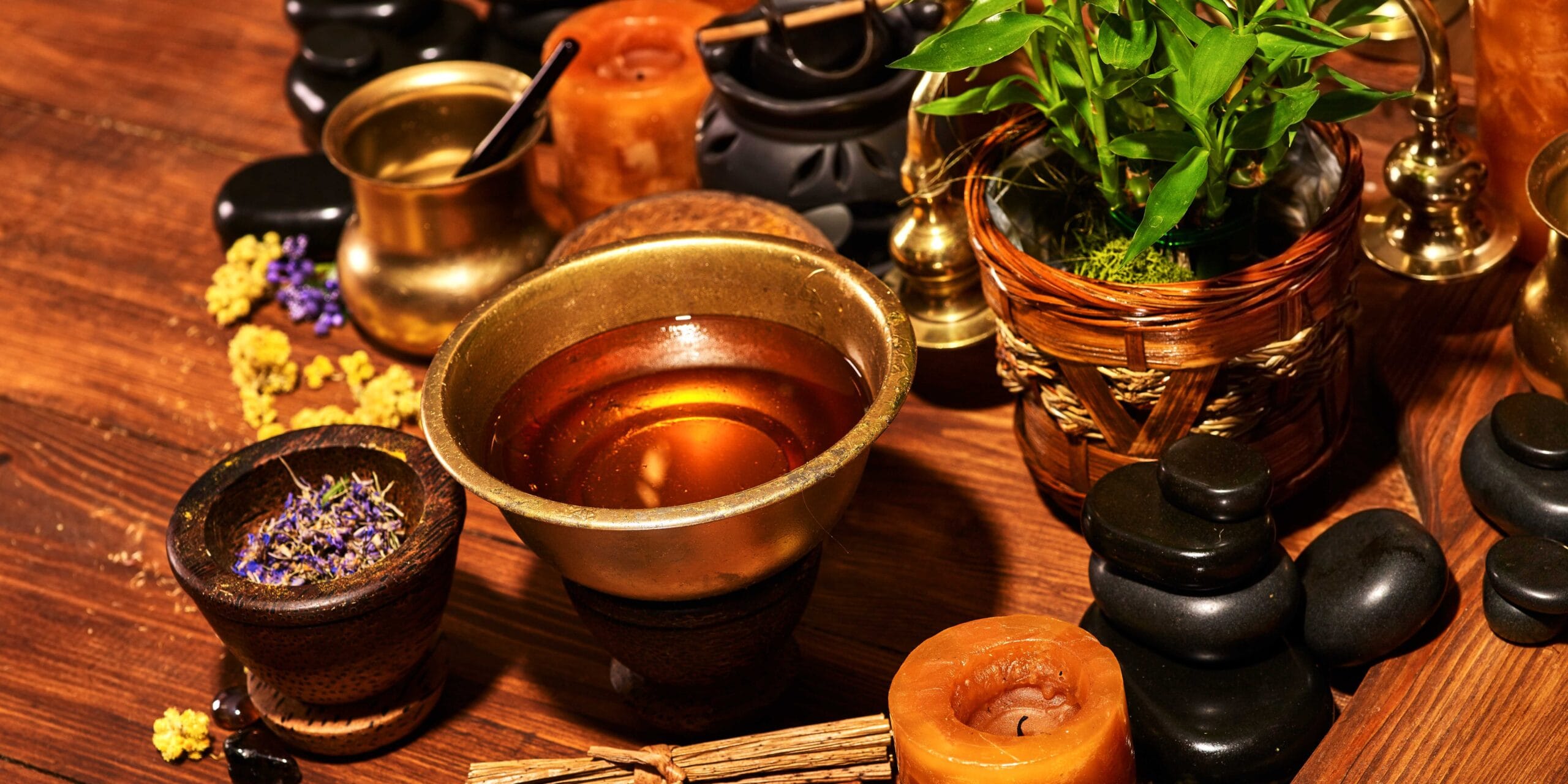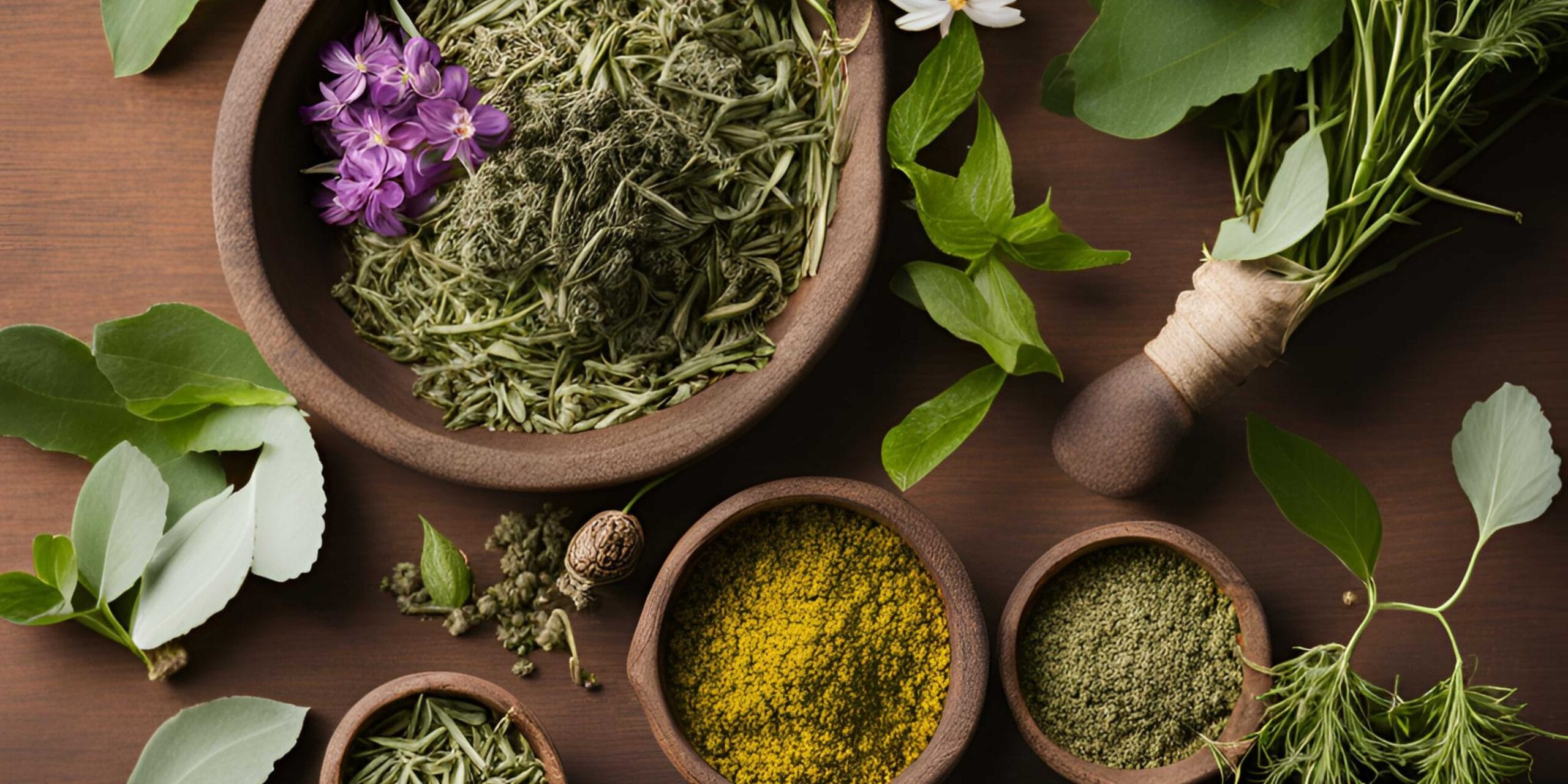Ayurveda, the ancient Indian system of natural healing, offers a wealth of knowledge when it comes to skincare. For centuries, Ayurvedic herbs and plants have been used to treat various skin conditions, from acne and pigmentation to signs of aging. By tapping into the power of nature, you can achieve glowing, healthy skin without relying on chemical-laden products. In this blog, we explore how incorporating Ayurvedic plants into your skincare routine can help you achieve a radiant complexion while promoting overall skin health. From Neem to Aloe Vera, these plants offer potent, natural solutions for skin rejuvenation. 1. Neem for Acne-Prone Skin If you struggle with acne or frequent breakouts, Neem is one of the most effective Ayurvedic herbs for clear skin. Its antibacterial and antifungal properties help combat acne-causing bacteria and soothe inflamed skin. Neem also helps balance oil production, making it perfect for oily or combination skin types. Incorporating Neem into your routine—whether as a face mask, cleanser, or spot treatment—can help reduce blemishes and promote a smoother complexion. 2. Aloe Vera for Hydration and Healing For dry or sensitive skin, Aloe Vera is a must-have in your skincare arsenal. Known for its soothing and hydrating properties, Aloe Vera is ideal for healing irritated skin, reducing redness, and preventing moisture loss. Regular use of Aloe Vera gel can calm sunburns, reduce the appearance of scars, and keep your skin hydrated and supple. Its lightweight texture makes it suitable for all skin types, including those with sensitive skin conditions like eczema. 3. Turmeric for Brightening and Anti-Aging Turmeric is another Ayurvedic powerhouse when it comes to skincare. Its active compound, curcumin, is a potent antioxidant that helps reduce inflammation, brighten the skin, and fight signs of aging. Turmeric can help fade dark spots, reduce wrinkles, and give your complexion a natural glow. Whether applied as a mask or incorporated into your diet, Turmeric is a versatile ingredient that supports both internal and external skin health. 4. Tulsi for Detoxifying the Skin Tulsi (Holy Basil) is often used in Ayurvedic skincare to detoxify and purify the skin. Its antibacterial and anti-inflammatory properties make it ideal for treating skin infections, calming inflammation, and reducing redness. Tulsi also helps clear out impurities from the skin, leaving it refreshed and rejuvenated. When used regularly, Tulsi can support clearer skin and reduce the appearance of blemishes and dark spots. Why Ayurvedic Skincare is Perfect for Modern Wellness The beauty of Ayurvedic skincare lies in its holistic approach. Rather than just treating external symptoms, Ayurveda emphasizes overall wellness, combining diet, lifestyle, and skincare practices to promote healthy, glowing skin. Using Ayurvedic herbs in your skincare routine offers natural, long-term solutions without the need for harsh chemicals. How to Use Ayurvedic Plants in Your Skincare Routine Incorporating Ayurvedic plants into your skincare routine is easy. You can use fresh plant extracts, herbal powders, or oils to create DIY face masks, cleansers, and moisturizers. Start by applying a Neem or Tulsi face mask once a week to treat acne or inflammation. Aloe Vera gel can be used daily to hydrate and heal, while Turmeric can be mixed into face masks to brighten the skin. Over time, these natural remedies will enhance your skin’s natural beauty, keeping it healthy and radiant.
Top 5 Ayurvedic Plants for Everyday Wellness
Ayurvedic plants have been used for thousands of years to maintain balance and harmony within the body. Today, these time-tested natural remedies are making a strong comeback in modern wellness, thanks to their proven ability to boost health, reduce stress, and improve overall vitality. If you’re looking to incorporate Ayurvedic herbs into your daily routine, here are five must-have plants that offer a range of benefits. 1. Ashwagandha: The Stress-Buster If you often feel overwhelmed or mentally fatigued, Ashwagandha is the herb for you. Known for its adaptogenic properties, Ashwagandha helps regulate stress by balancing cortisol levels—the hormone responsible for your body’s stress response. Not only does it reduce anxiety, but it also boosts mental clarity and cognitive function, making it an excellent supplement for both mental and emotional well-being. 2. Turmeric: Nature’s Anti-Inflammatory One of the most popular Ayurvedic herbs in the world, Turmeric is renowned for its anti-inflammatory and antioxidant properties. Its active compound, curcumin, makes it a powerful remedy for reducing inflammation, particularly in the joints. Whether you’re dealing with arthritis or simply want to improve your immune system, incorporating turmeric into your diet can do wonders for long-term health. 3. Tulsi (Holy Basil): For Respiratory Health When it comes to Ayurvedic plants for respiratory wellness, Tulsi is the gold standard. This sacred herb helps clear up respiratory issues like coughs, colds, and congestion while also strengthening the immune system. Its adaptogenic properties also aid in reducing stress, making it a versatile herb for overall health and well-being. 4. Giloy: The Immunity Booster Giloy is another Ayurvedic powerhouse, known for its immune-boosting properties. It helps the body combat infections and promotes overall wellness by reducing inflammation and detoxifying the system. Incorporating Giloy into your routine can improve your resilience to seasonal changes and infections. 5. Triphala: For Digestive Health Good digestion is central to Ayurvedic healing, and Triphala—a blend of three fruits: Amalaki, Haritaki, and Bibhitaki—is a key player in promoting digestive health. It helps in detoxifying the body, improving bowel regularity, and enhancing nutrient absorption. If you frequently experience bloating or indigestion, Triphala is an excellent natural remedy to include in your wellness regimen. Why Ayurvedic Plants Are Essential for Everyday Health Ayurvedic plants offer holistic solutions to a variety of common health issues, from stress to digestive problems. Unlike modern medicine, which often treats symptoms in isolation, Ayurveda addresses the root causes of imbalances, offering more comprehensive and long-lasting health benefits. Whether you’re seeking to reduce stress, boost immunity, or improve digestion, incorporating Ayurvedic herbs into your daily routine can help you achieve optimal health naturally. Their versatility allows them to be used in multiple forms—powders, teas, oils, and supplements—making it easy to tailor your wellness routine according to your needs. How to Use Ayurvedic Plants in Your Daily Life Start by adding a few of these powerful herbs to your diet or wellness routine. Whether it’s a morning cup of Tulsi tea for respiratory health or a supplement of Ashwagandha to reduce stress, small changes can make a big impact on your overall well-being. Over time, you’ll experience the cumulative benefits of these ancient remedies as they work to balance both mind and body. Explore the World of Ayurvedic Plants At Taran Ayurved, we offer a wide range of Ayurvedic herbs and products designed to help you live a balanced, healthy life. Our selection is curated to provide you with the best in natural wellness, ensuring you get the most from these powerful plants. Start your journey toward optimal health by incorporating these ancient remedies into your daily routine today.
How Ayurvedic Plants Can Transform Your Health
As more people turn to natural remedies for health and well-being, Ayurveda—the ancient Indian system of medicine—has gained tremendous popularity. Rooted in nature, Ayurveda uses powerful herbs and plants to address physical, mental, and emotional imbalances. Whether you’re dealing with stress, digestive issues, or looking to boost your immune system, Ayurvedic plants can play a transformative role in your wellness journey. In this blog, we’ll explore how Ayurvedic herbs can integrate seamlessly into modern life and offer lasting health benefits. From Ashwagandha to Tulsi, these plants have proven their efficacy for centuries, providing holistic solutions to common health problems. 1. Stress Management with Ashwagandha In today’s fast-paced world, stress has become a part of everyday life. Ashwagandha, often referred to as Indian Ginseng, is one of the most effective Ayurvedic herbs for stress relief. Known for its adaptogenic properties, Ashwagandha helps regulate cortisol, the hormone responsible for stress. It not only reduces anxiety but also improves mental clarity, focus, and resilience. Whether you’re managing workplace stress or everyday anxieties, adding Ashwagandha to your routine can significantly enhance your emotional balance. 2. Turmeric for Inflammation and Joint Health Turmeric is a golden-yellow spice widely recognized for its anti-inflammatory properties, thanks to its active compound curcumin. In Ayurveda, Turmeric is used to alleviate joint pain, particularly in individuals with arthritis or inflammation-related conditions. But its benefits go beyond joint health—Turmeric also strengthens the immune system, offering protection against infections and supporting overall vitality. Incorporating this spice into your diet, whether as a supplement or in meals, promotes long-term health and well-being. 3. Tulsi for Respiratory Wellness If you’re prone to respiratory issues or seasonal allergies, Tulsi (Holy Basil) is an essential herb to include in your routine. Known for its adaptogenic and anti-inflammatory properties, Tulsi supports respiratory health by helping to clear congestion and soothe the respiratory tract. Regular consumption of Tulsi, either as a tea or supplement, can improve lung function, relieve coughs, and strengthen the body’s natural defenses against respiratory ailments. 4. Boosting Digestion with Triphala Good digestion is the foundation of health in Ayurveda. Triphala, a combination of three fruits—Amalaki, Haritaki, and Bibhitaki—is a trusted herbal remedy for improving digestion and detoxifying the body. It helps regulate bowel movements, reduce bloating, and enhance nutrient absorption, promoting a well-functioning digestive system. Whether taken in powder or supplement form, Triphala is a must-have remedy for those looking to optimize digestive health. Why Ayurvedic Plants are Ideal for Modern Wellness One of the key reasons Ayurvedic herbs remain relevant in modern wellness is their holistic approach to healing. Rather than treating individual symptoms, Ayurveda focuses on balancing the mind, body, and spirit. By incorporating Ayurvedic plants into your routine, you’re not just addressing a particular health issue—you’re promoting long-term wellness. Ayurvedic herbs are versatile and can be used in various forms, such as teas, powders, oils, or supplements, making them easy to incorporate into any lifestyle. Whether you’re dealing with stress, digestive problems, or inflammation, these natural remedies offer sustainable solutions that work with your body’s innate healing abilities. How to Start Using Ayurvedic Plants in Daily Life Incorporating Ayurvedic plants into your wellness routine doesn’t require major lifestyle changes. Start small by adding herbs like Turmeric and Tulsi to your daily meals or beverages. For stress relief, consider taking Ashwagandha as a supplement or in tea form. If you’re looking to improve digestion, a daily dose of Triphala can help you maintain a healthy digestive system. Gradually, these herbs will become a natural part of your routine, supporting your journey toward holistic health.
Discover the Power of Ayurvedic Plants: A Guide to Natural Healing
Discover the Power of Ayurvedic Plants: A Guide to Natural Healing In today’s fast-paced world, people are turning to natural remedies to boost their health and well-being. One of the most powerful approaches to holistic health is Ayurveda, an ancient Indian practice that has used Ayurvedic plants for centuries. These plants not only address physical ailments but also promote mental clarity, stress relief, and overall balance in life. In this blog, we’ll explore some of the most effective Ayurvedic herbs and their incredible health benefits. Whether you’re new to Ayurveda or already familiar with it, this guide will help you understand the value of incorporating these natural remedies into your daily life. 1. Ashwagandha: The Stress Reliever Ashwagandha, also known as Indian Ginseng, is one of the most renowned Ayurvedic herbs for stress relief. It works by regulating cortisol levels, the hormone responsible for our body’s stress response. Regular use of Ashwagandha can reduce anxiety, promote relaxation, and enhance mental clarity. If you’re looking for a natural way to combat stress and improve focus, this powerful herb should be part of your wellness routine. 2. Turmeric: Nature’s Anti-Inflammatory Hero Turmeric, with its active compound curcumin, is celebrated for its anti-inflammatory properties. It’s widely used in Ayurveda to treat joint pain, arthritis, and inflammation. Beyond its healing abilities, turmeric boosts the immune system, helping your body fight off infections and maintain optimal health. Adding Turmeric to your daily routine can support both joint health and immunity, keeping your body strong and resilient. 3. Tulsi: The Holy Basil for Respiratory Health Tulsi, or Holy Basil, is another superstar in the world of Ayurvedic medicine. Known for its adaptogenic qualities, Tulsi helps the body adapt to stress while supporting respiratory health. It is often used to relieve colds, coughs, and asthma. Tulsi is also great for improving lung function and boosting overall immunity. Including Tulsi in your daily regimen helps keep respiratory issues at bay and strengthens the body’s natural defenses. 4. Triphala: Digestive Health Made Easy In Ayurveda, digestion is considered the key to good health, and Triphala is one of the most trusted herbal remedies for improving digestion. Made from three powerful fruits—Haritaki, Bibhitaki, and Amalaki—Triphala promotes healthy digestion, detoxifies the body, and enhances nutrient absorption. It is widely used to prevent bloating, constipation, and indigestion, making it a must-have for those seeking to improve gut health. 5. Giloy: The Immunity Booster Known as a potent Ayurvedic remedy for boosting immunity, Giloy has gained popularity for its ability to fight chronic infections and purify the blood. This herb works wonders in improving liver health and protecting against common illnesses. Giloy helps cleanse toxins from the body and promotes long-term vitality, making it essential for anyone focused on improving overall wellness. How to Integrate Ayurvedic Plants into Your Lifestyle Adding Ayurvedic plants to your daily routine is easier than you think. You can consume these herbs in various forms, such as powders, teas, or supplements. Many people prefer to drink herbal teas made from Ashwagandha or Tulsi for stress relief or respiratory health. Turmeric can be added to meals or taken as a supplement, while Triphala is often consumed in powder form to aid digestion. To start your journey with Ayurveda, focus on your specific health needs and choose the plants that best support those goals. Whether it’s stress relief, joint pain, or boosting your immune system, there’s an Ayurvedic plant to help you along the way.




